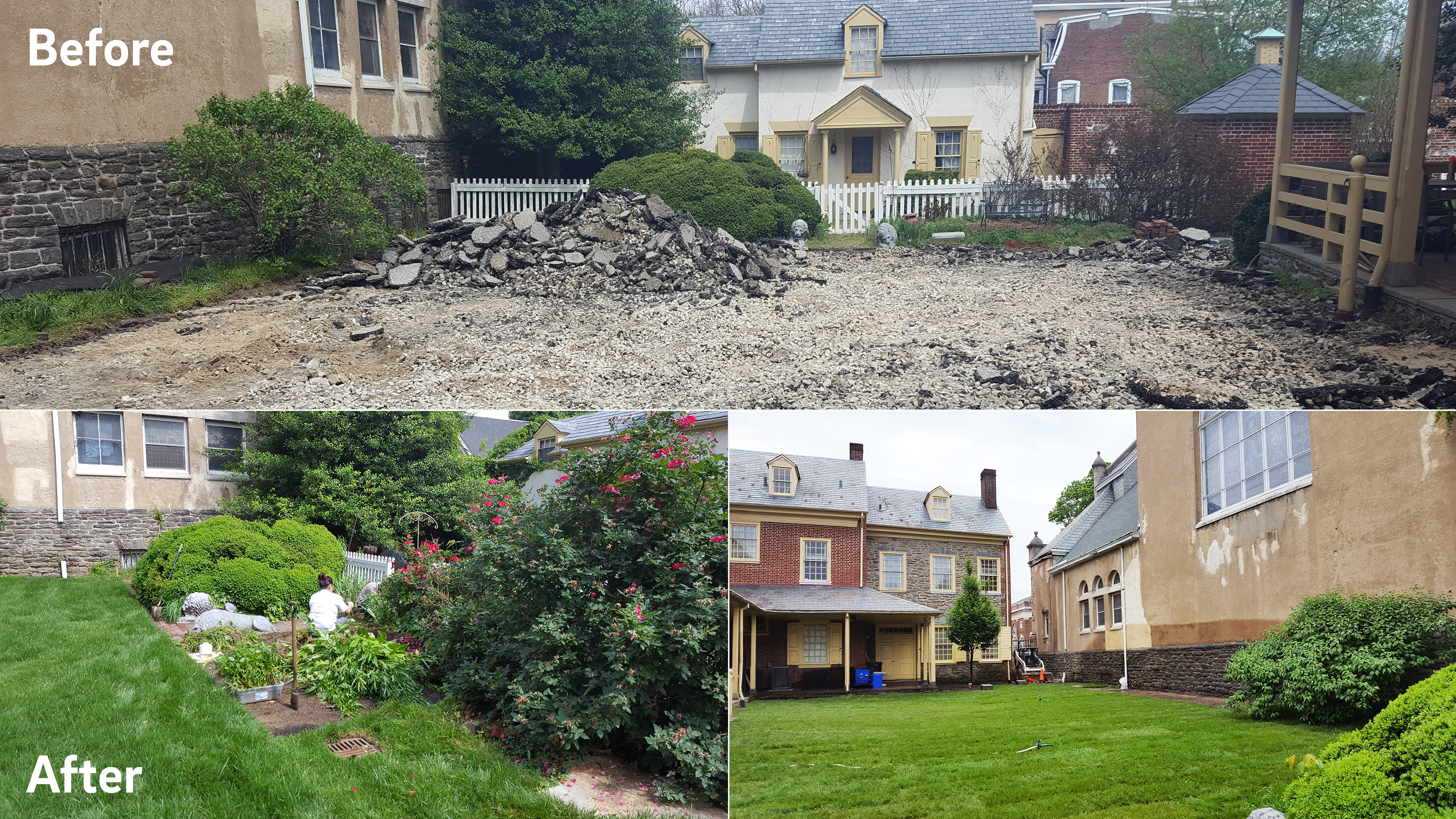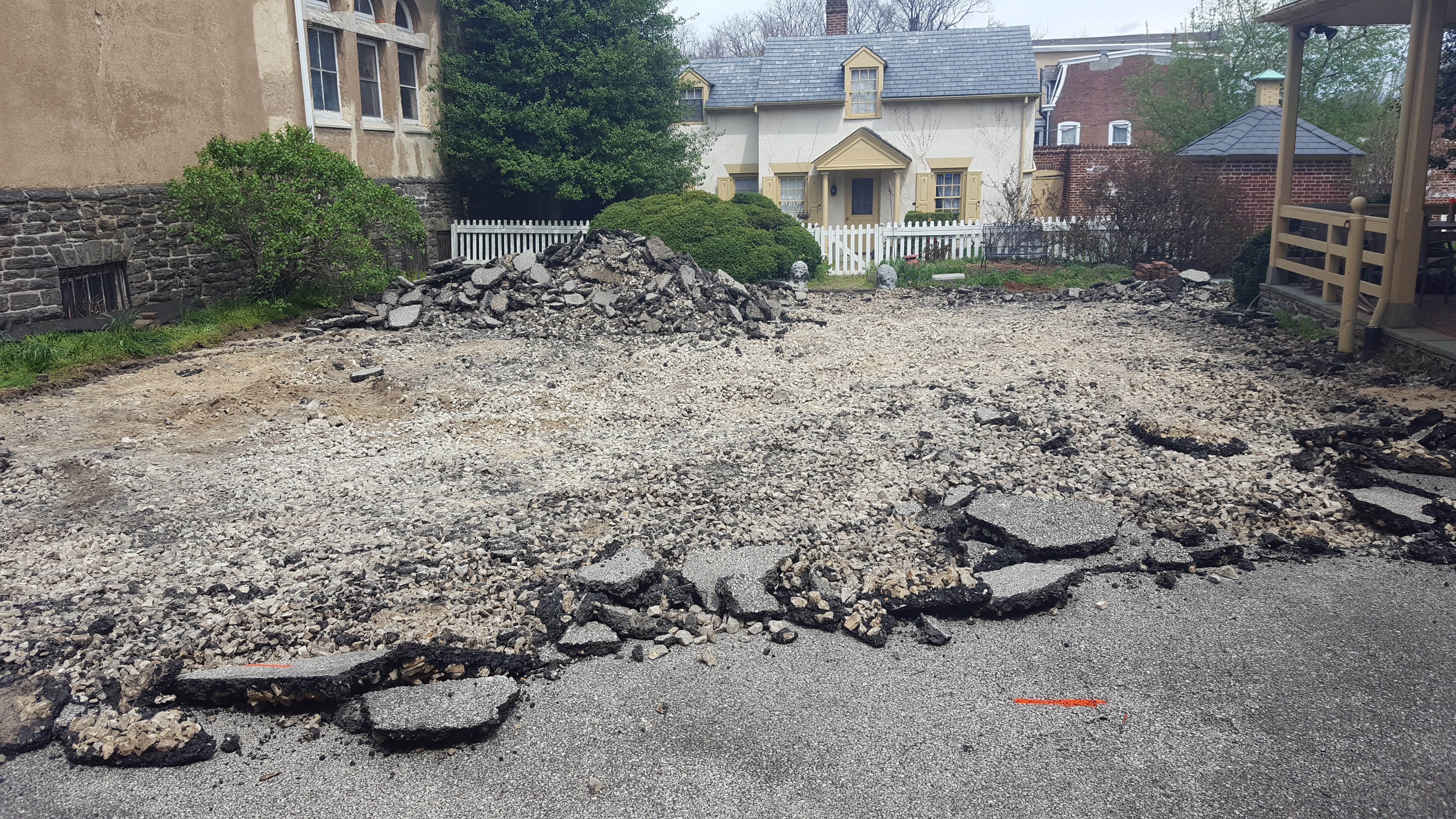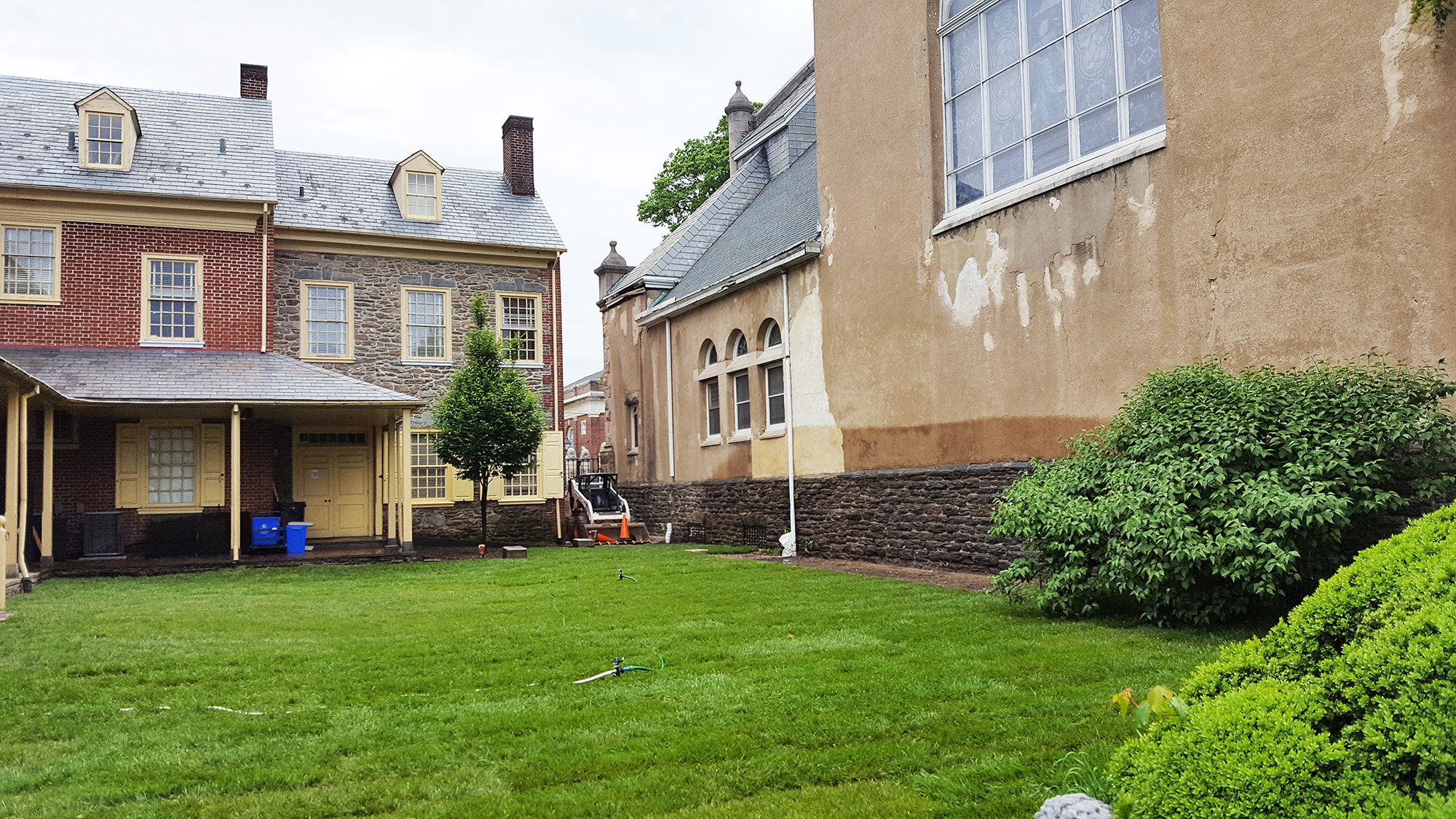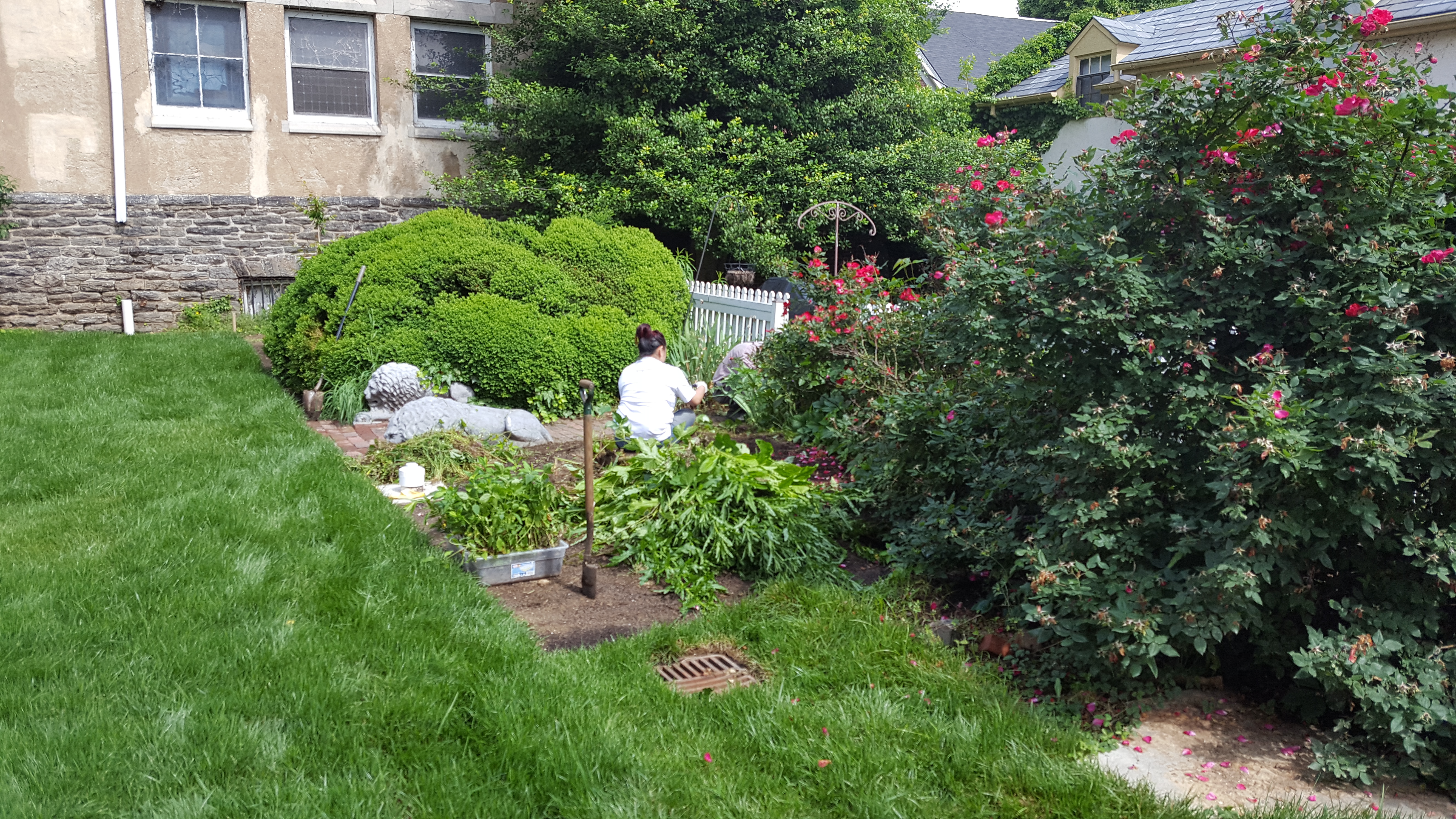
Historic Germantown earns the 2018 Stormwater Pioneers award for their new rain garden, redesigned courtyard space, and commitment to the community and health of our waterways.
When leadership at Historic Germantown first began making plans to replace their asphalt courtyard with a natural green space, the opportunity to turn it into a showcase for stormwater management wasn't exactly at the top of the organization's list of priorities.
In fact, the idea of a green stormwater project wasn't on their list of ideas at all.
Despite being in the dark at the beginning, the nonprofit is getting a major spotlight in Philadelphia’s sustainable development community as this year's Stormwater Pioneer. That distinction will be made official during a May 24 ceremony at their Germantown Avenue headquarters featuring City officials, community members, and project partners. Invite Friends on Facebook.
The Path to Becoming Pioneers
Trapeta Mayson, who served as Executive Director of Historic Germantown throughout the planning and construction process, notes that there already had been a fundraising effort underway, including the creation of a GoFundMe page, to help the organization raise resources needed to transform the property.
“Originally, we had an idea of what we wanted to do with the space, but we had not researched the costs involved for an overall construction program. We also had some discussions with other community organizations in the area, including Friends of Market Square Park, because what we were thinking about could also be considered an extension of Market Square Park.”

The courtyard prior to its green upgrade
“Frankly, when we started planning this project to revitalize the courtyard space, the last thing on our minds was SMIP,” says Mayson, referring to the Philadelphia Water Department’s Stormwater Management Incentives Program. “We were simply looking for ways to take this existing asphalt courtyard and turn it into a more functional, inviting space that the entire community could benefit from.”
SMIP was launched in 2012 to help the City of Philadelphia achieve federally mandated cuts to pollution from stormwater runoff and related overflows in combined sewers. An older portion of the wastewater collection system, combined sewers carry sewage and water from storms. About $90 million in SMIP grant funding has encouraged green stormwater improvements at 160 nonresidential properties in the city, including schools, nonprofits and faith-based organizations.
SMIP to the Rescue
At first, it didn’t appear Historic Germantown would be eligible for the SMIP program. But after several discussions with Erin Williams, program manager for Stormwater Billing & Incentives at the Water Department, the path began to clear.
“She told us they take applications on a quarterly basis, and end up doing about 16 sites a year of all different sizes,” Mayson says.
Historic Germantown was one of the smallest.
“We ended up having to tweak our application a couple of times before we were able to get it approved. We started with some rather grandiose ideas—for example, we wanted to use pavers to cover the interior of the courtyard. They would be pervious, so water would be able to infiltrate through the soil. But the pavers were very expensive, more than what the SMIP grant would cover.”
Other details also needed to be worked out. From submitting proposals to working out details and issues and finally getting approval, the process ended up taking about eight months.

A Community-Powered Project
According to Mayson, the fact that this turned out to be a truly a community-based and community-supported project is one of its most important and rewarding aspects.
“The relationship of the site to the community was very important. Historic Germantown is a very visible and important amenity and space in the neighborhood,” she says. “It’s a real treasure for members of the surrounding community, many of whom have a very strong interest in gardening and horticulture, which has always been part of the history of Germantown.”
According to Claudia Levy, a landscape architect who did the design for the project through Levy DiCarlo Partners, Germantown has a longstanding horticulture and landscape history that the new project resonates with nicely.
Some of the early pioneers in the horticulture trade created magnificent nurseries and gardens in the Germantown and Mount Airy neighborhoods that continued into the early 20th century, she says.
Volunteers and supporters have been very active in maintaining the landscapes of several Historic Germantown sites and contributed several work days to help reduce costs during the courtyard makeover. Community members also contributed to the GoFundMe campaign to pay for trees, shrubs, and other plants now thriving in the courtyard and rain garden.

Because of the nature of the project, Mayson notes, it was important to get the rain garden in first. The parking lot, in particular, was very much a community-involved work effort.
“We had approximately 15 members from our organization helping to clear the area between the parking lot and the street. It took about three clearing days and then three planting days to complete. It literally changed the streetscape,” she says. She adds that the result is earning a flood of positive comments from neighbors and visitors.
Building a Team for the Future
Apparently, the positive reception planted the seeds for more community support in Germantown.
“As the landscape architects, we find the enthusiasm of the volunteers to be an added benefit because you can see how it contributes to the overall quality of life of the surrounding community,” Levy says. “People take a lot of pride in that.”
That’s a sentiment that the folks at Historic Germantown are hoping to keep tapping into.
“One of our long-term goals that came about as a result of the rain garden project is the establishment of a volunteer Green Team,” explains Mayson. “We’re hoping to build on the enthusiasm that our neighbors and volunteers have shown as they’ve come together to help maintain and weed the rain garden.”
In the end, though, it’s more than just a Historic Germantown project, she says.
“It’s really come to serve the purpose of bringing together the entire community—staff, volunteers, neighbors—everyone involved seems to feel invested in this project and in maintaining the majesty of this wonderful community asset.”
Pioneers of Days Past
Introduced in 2014, the Stormwater Pioneers award puts a spotlight on stormwater management projects spearheaded by private property owners. These projects showcase innovation, excellence, the ability to overcome technical challenges and a true dedication by the property owners, developers, engineers and designers to improve the environment and reduce stormwater runoff.
Previous Pioneers include Popi’s, a small South Philadelphia Italian restaurant where the family ownership used a SMIP grant to build lush rain gardens in the parking lot, and the Children’s Hospital of Philadelphia. Highlighted in 2017, the CHOP project involved a high-tech system of computer-controlled stormwater retention tanks and a therapeutic green roof garden where healing families unwind. The inaugural award went to Stanley’s Hardware in Roxborough.
As SMIP participants, Historic Germantown, Popi’s and Stanley’s are eligible to save significantly on monthly stormwater fees charged to nonresidential properties in Philadelphia.